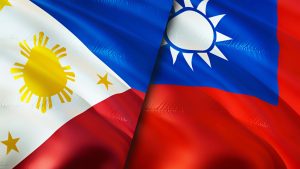China has lodged “stern representations” to the Philippines over its recent engagement with Taiwan, according to the country’s Ministry of Foreign Affairs.
Liu Jinsong, director-general of the Ministry’s Department of Asian Affairs, summoned Philippine Ambassador Jaime FlorCruz to express “strong dissatisfaction” with Manila’s recent “negative moves” concerning Taiwan, as well as other maritime and security issues, the Ministry said in a statement on Friday.
“Bloc politics and camp confrontation reflect a Cold War mentality, which runs counter to the trend of the times and is unwelcome among regional countries,” Lin reportedly added.
Such protests have become a commonplace of China-Philippines relations over the past few years, as the two nations have clashed in disputed parts of the South China Sea. While the Chinese Foreign Ministry did not specify the exact incidents that triggered the protest, it “reaffirmed its longstanding positions on Taiwan and the South China Sea,” the Tribune reported.
This suggests that the protest may have been related to a Washington Post report published on July 14, which stated that the Philippines was “quietly ramping up both formal and informal engagement” with Taiwan, including on security. Citing government officials, defense analysts and diplomats, the report stated that security cooperation “is further along than publicly disclosed.”
Since opening diplomatic relations with Beijing in 1975, the Philippines has officially adhered to a “One China Policy,” which “recognizes the Government of the People’s Republic of China as the sole legal government of China” and “fully understands and respects the position of the Chinese Government that there is but one China and that Taiwan is an integral part of Chinese territory.”
However, as Taiwan has become the focus of growing tension between China and the United States, and relations between China and the Philippines have deteriorated over the South China Sea, the Philippines has begun more actively to engage it “unofficially” on an economic and diplomatic level.
A Washington Post report suggests this cooperation also has an increasingly robust security dimension. It revealed that the Philippine Coast Guard had recently conducted patrols with its Taiwanese counterpart in the Bashi Channel, which separates Taiwan from Batanes, the Philippines’ northernmost province. It said that Taiwan also sent navy and marine corps personnel to observe the Kamandag joint exercise led by the United States and Philippine marines. It said that Taiwanese personnel “did not officially participate,” but were involved in tabletop planning and “watched in real time as cooperation unfolded among the U.S. allies.” The Post report quoted a Taiwanese government adviser who said that “our security and military cooperation with the Philippines is going to get closer and closer.”
China has protested every hint of growing closeness between Manila and Taipei. In January 2024, China’s government summoned the Philippine ambassador and warned Manila “not to play with fire” after President Ferdinand Marcos Jr. congratulated Lai Ching-te on his election as Taiwan’s president.
However, the increased engagement with Taiwan, like the Philippines’ growing security harmonization with partners like the U.S., Japan, and Australia, is hard to disentangle from China’s own policy in the South China Sea, which has involved more frequent and intense incursions into the Philippines’ exclusive economic zone. Over the past few years, the two nations have engaged in growing clashes in which the China Coast Guard has allegedly rammed and fired high-pressure water cannons against Philippine coast guard and fisheries bureau vessels.
For this reason, the Philippines has been entitled to negotiate the scope of its relationship with Taiwan, Philippine Defense Secretary Gilbert Teodoro told the Post. He added that “previous attempts to appease its powerful neighbor have gone nowhere,” in the newspaper’s paraphrase. He added, “It would be hiding from the obvious to say that Taiwan’s security will not affect us.”

































